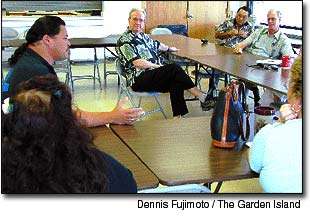LIHU‘E — Kaua‘i community leaders and concerned citizens are urging the community to get involved in the war on drugs by being part of a statewide protest against the expansion of drugs.
The sign-holding event is set for Thursday, Sept. 25, the day after the broadcast of “Ice: Hawai‘i’s Crystal Meth Epidemic” on an unprecedented eight local television stations.
M.P. “Andy” Anderson, chief executive officer of Hina Mauka, the nonprofit treatment center with locations on all islands; and the Rev. Keith Ryder of the Light of Promise Ministries in Kahalu’u, O‘ahu, met with Kaua‘i community leaders and concerned members of the community at the HGEA building here yesterday to discuss the ice epidemic in the islands.
The meeting focused on how the community can get involved with helping to stem the ice tide sweeping over the islands.
Ryder, who has been instrumental in starting sign-waving demonstrations on O‘ahu, inspired community leaders to start their own Kaua‘i movements, and join other communities in the state on Sept. 25, from 4 p.m. to 6 p.m.
Their mission is to have “positive signs, showing the addicts we care,” said Ryder.
“We know that we’re not going to solve all the problems in a year,” said Anderson, but “there’s a strong wave going on right now” where people are standing up and refusing to allow this to continue.
“People saw something they could do to find some kind of solutions for the violence, death,” and general unhappiness that surrounds addiction, Anderson said, adding that the sign-waving campaign is one way to do that.
The Rev. Roy “Rocky” Sasaki volunteered to spearhead the campaign on Kaua‘i. He said that he will be in contact with local police, politicians, hotel managers, the Kaua‘i Chamber of Commerce, Bible clubs in the schools, and other faith-based communities to organize the event.
“That’s what it takes; a real grassroots program,” said Sasaki. “We all have to work together and become pro-active in the community. If we do, I think we’ll see the drug problem go down.”
He believes that the timing, the day after the showing of the documentary, will help get the community involved.
“Hopefully the ‘Ice’ presentation will provoke conversation,” Sasaki said. “Groups should talk about it, and then get involved.”
For those at work, Sasaki said, he has contacted the co-producer of the film so that he can get a copy to Ho‘ike Community Television Inc. so that those who cannot watch the initial broadcast can see it at another time. The show will air on Wednesday, Sept. 24, from 7 p.m. to 8 p.m.
After the organization of the sign-waving event, Ryder discussed with the audience ways in which his community, the Kahulu‘u neighborhood on the leeward side of O‘ahu, was fighting the war on drugs.
He described his work with the community watch, which, he said, had displaced many drug dealers and users. Prayer meetings are now held in a park that was once notorious for drug dealing.
“It is an organized effort working closely with law enforcement” to take back our community, he said. “It became a community problem. It needs community solutions.”
“We need to tackle this in as many different ways as we can,” said Anderson.
Roy Nishida, county anti-drug coordinator, added that any Kauaian who witnesses drug activity can call the new state Attorney General anti-drug hotline, toll-free at 1-800-9NO-METH. (966-6384).
Callers can remain anonymous, and since the call goes off-island, “you will never be speaking to someone from Kaua‘i who may recognize your voice,” Nishida said in a prior interview.
Phil McLaughlin, program coordinator for Hina Mauka on Kaua‘i, said he is looking forward to the broadcast.
“Any exposure will help,” he said, “getting people on the same page that there is treatment available.”
But he worries that families might see the program and force their loved ones into treatment, which does not work.
“Treatment works, but you have to be open to it.”
Meanwhile, the family needs education and support, he said, adding that education for the family of addicts and alcoholics is available free at Hina Mauka every Tuesday night.
Al-Anon and Nar-Anon, which are free programs that are also designed to support families, are also available on the island.
To get involved in the sign-waving campaign, please call Sasaki, 246-0774.
Staff Writer Tom Finnegan may be reached at 245-3681 (ext. 226).


